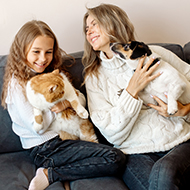Antibiotic resistant bacteria transmitted between pets and owners, study finds

"Our findings verify not only the sharing of antibiotic resistant bacteria but also of resistance genes between companion animals and their owners in the community" - Dr Juliana Menezes.
A study has discovered that healthy pet dogs and cats could be passing on antibiotic resistant bacteria to their owners, alongside genes which play a key role in bacterial resistance.
Led by Dr Juliana Menezes from the University of Lisbon, and Dr Sian Frosini from the Royal Veterinary College (RVC), the study will be presented at this year's European Congress of Clinical Microbiology and Infectious Diseases (ECCMID) in Lisbon.
The researchers wanted to discover how antimicrobial-resistant bacteria are spread, and whether they can be passed between healthy companion animals and humans.
Researchers were particularly interested in ESBL and AMPC-producing Enterobacteriaceae (AMPC-E) and Carbapenemase-producing Enterobacterales (CPE) which are resistant to multiple antibiotics.
Using stool samples from 58 healthy people and the 18 cats and 40 dogs that lived with them from Portuguese households, and from 56 healthy people and 45 dogs from households in the UK.
Collecting samples at monthly intervals for four months, the researchers used genetic sequencing to identify the species of bacteria in each sample, and the presence of drug resistance genes.
Dr Menezes commented: “Our findings verify not only the sharing of antibiotic resistant bacteria but also of resistance genes between companion animals and their owners in the community, underscoring the need for continuous local surveillance programmes to identify the potential risk to human health.”
Over the course of 2018 to 2020, 15 per cent of pets and 13 per cent of household members from both countries were found to be carrying ESBL and AmpC-producing bacteria.
Of these, almost half of the companion animals, and one third of the household members were colonised with at least one multidrug-resistant strain.
Dr Menezes explained: “Sometimes the bacteria may not be shared, but their resistance genes can be.
“These genes are found in mobile bits of DNA, meaning that they can be transferred between different bacterial populations in animal and humans.
“Even before the COVID-19 pandemic, antibiotic resistance was one of the biggest threats to public health because it can make conditions like pneumonia, sepsis, urinary tract and wound infections untreatable.
“Although the level of sharing from the households we have studied is low, healthy carriers can shed bacteria into their environment for months, and they can be a source of infection for other more vulnerable people and animals such as the elderly and pregnant women.
“Our findings reinforce the need for people to practice good hygiene around their pets and to reduce the use of unnecessary antibiotics in companion animals and people.”
This observational study is not yet a full-paper, and has not yet been submitted to a journal for publication.



 The latest
The latest